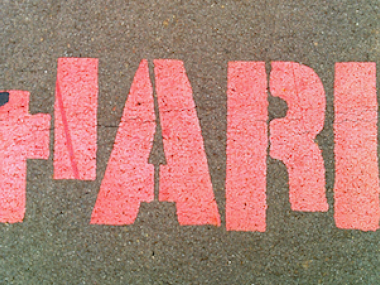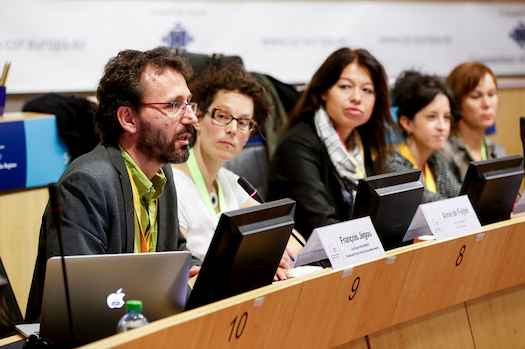Food-related Initiatives for Sustainable Local Development: Lessons from URBACT
Edited on
09 October 2017This was the topic of one of the workshops organised by URBACT, during the Open Days in Brussels on the 9th of October. Its aim, understand how city initiatives related to food can lead to local economic, social, environmental development and citizen engagement. Let’s see which were the main points!

‘If you start a local food network invite people in a friendly environment, a roof garden or even a farm!’ Anne de Feijter, Communication advisor from the Municipality of Amersfoort (NL) recommended. Involved in the URBACT Sustainable Food for Urban Communities network, she explained Amersfoort’s brokerage role in promoting sustainable food while engaging and co-creating with citizens. The city has set up a Local Support Group called “Real Food Network” composed of people from the administration, citizens and other local stakeholders. Together they have produced a Local Action Plan along three axes: growing the local economy with farms around the city and community gardens inside the city; delivering food to people (i.e. partnerships between butchers and bike couriers to deliver local food in a sustainable way); enjoying local food in local restaurants and initiating children in local food production and selling. These initiatives have a clear positive impact on social participation, inclusion and health. Anne stressed that in order to achieve these results a local government needs to be curious, close and approachable to citizens.
Another possible role for the Municipality is in developing modern markets for the city. Nowadays, local markets have to be highlighted as urban policy tools; they also need to be competitive with an adapted infrastructure to attract people. If they do so, they generate jobs and foster employment and entrepreneurship. In Wroclaw (PL), partner of URBACT Markets network, a modern farmers market with traditional atmosphere recently opened in an old square (regenerated), becoming a big attraction for visitors. Another step had yet to be made for attracting young people to work and buy in the market. The city decided to speak young people’s language and launched a media campaign with local media and Master Chef TV Show with regional farms. In addition, within the framework of URBACT Markets network, they have established an International Day of Markets with events in local markets free of charge for all.
And what about using public procurement as a way to develop a more sustainable way of living and consuming? This is the case of Södertälje, Lead Partner of the URBACT Diet for Green Planet network. In 2001 the city decided to stop pre-prepared and powder canteen food in order to promote a tastier, healthier, organic locally produced and sustainable food chain in the city. Nowadays thanks to public procurement clauses, 30% of citizens are fed with local and organic food through school canteens (23,000 portions/day) and 95% of the school kitchens cook their own menus with children’s involvement. Through public procurement, more than 50% of school food is now organically produced. The results of this sustainable food strategy also count a reduction of meat consumption by 30% since 2010 and reduction of leftovers by 30-40%.

But besides all the ingredients and possible recipes outlined above, another element is equally important. ‘Cities need good professionals and products. Take advantage of the smallest asset you have, put it in a good box and promote it!’, says Rocio Rojo Arauzo, Project officer for Strategic Plan City of Burgos (ES), Lead Partner of Gastronomic Cities network. Otherwise said, the possibility to promote and develop your city through gastronomy. Rocio argued that we are living in an “experience economy” meaning that people want to experience things. Gastronomy is a real part of this and fosters links with consumers, chefs and social networks. Even for cities with less food tradition there is always something that is locally outstanding even if this is in a very small scale. If a city has a good product and professionals, then there can be a huge potential for growth.
In conclusion we can say that sustainable food practices initiated by the city are economically, socially and environmental beneficial for all (consumers, citizens, local businesses). From all the examples above we can see the feasibility of a holistic and integrated strategy towards food and sustainable way of consuming, from public procurement and local school canteens, to engaging with citizens, children and local farmers and markets, and to promoting in the best way the local assets of a city. Necessary “ingredients” of such integrated sustainable local strategies are working in a horizontal way across services and departments and breaking through the municipal administration silos.
The article is based on the workshop report drafted by Jenny Koutsomarkou, Capitalisation officer at URBACT.
Speakers of the workshop:
Sara Jervfors, Head of Diet Unit, Municipality of Södertälje, Sweden
Malgorzata Golak, Head Specialist, Municipality of Wroclaw, Poland
Rocio Rojo Arauzo, Project officer, Strategic Plan City of Burgos, Spain
Anne de Feijter, Communication advisor, Municipality of Amersfoort, The Netherlands
Chair/moderator: François Jégou, Director of Strategic Design Scenarios, Lead Expert of the URBACT Sustainable Food in Urban Communities network, Coordinator of the URBACT workstream Social Innovation in Cities
Photo credits - Neerav Bhatt on flickr
Read more:
Diet for a Green Planet network – URBACT website
Sustainable Food – URBACT website
Gastronomic Cities – URBACT website
URBACT Markets – URBACT website
URBACT at the Open Days 2014 - URBACT website
 Submitted by Simina Lazar on
Submitted by Simina Lazar on




